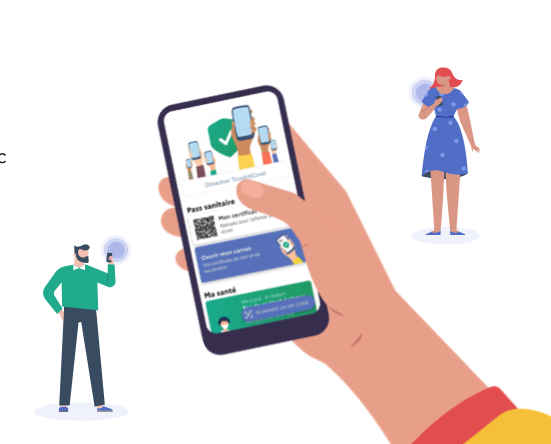Love in the Mountains: Holidays for Every Type of Connection
When we plan a holiday, it’s rarely just about the destination, it’s about the experience. The m
Read MorePosted 14-01-2022 by Sally Guillaume
France has finally opened its borders to the UK on 14th January 2022 after a long month of draconian restrictions which have caused havoc amongst ski and winter holiday makers and their respective hosts, including Undiscovered Mountains, in France. So, vaccinated British travellers can now come to France without any compelling reason and don't need to isolate but there are still things you need to know. This article aims to answer all your questions to help you plan a smooth and stress free journey to come join us in the French Alps as soon as possible! We have missed you!
Macron justified closing the borders to all non-essential travellers from the UK on the 18th of December 2021 to stem the spread of the, at the time, relatively unknown, Omicron variant. However, as the Christmas holidays passed and January progressed and France's population became infected at historical speed, with more cases than any other European country including the UK, the borders remained inexplicably closed.
Members from any other country in the world, including of course Europe, but also South Africa, where the Omicron variant was first detected, and America, with their own record cases were allowed in. The Brits, no. Why? Many have speculated as to the reasons why the United Kingdom was singled out with political posturing being the most popular theory, but why damage the prized ski industry by denying them of their favourite foreign tourists - it's a bit like biting off your nose to spite your face...? So we will never really know!
The full rules are detailed below and can also be found on the French government website.
You should not use the NHS testing service to get a test in order to facilitate your travel to France. You should arrange to take a private test from a private coronavirus testing provider. Test results must be certified by a laboratory to be accepted.
All travellers might be asked to take a test upon arrival in France, including at Gare du Nord for Eurostar arrivals. Anyone testing positive for COVID-19 will be subject to mandatory self-isolation for 10 days.
The French government has updated its guidance on entry requirements for red list countries, which UK is currently on and has confirmed that unvaccinated “minors” can enter France with a vaccinated adult.
France’s interior ministry now says: “The measures applied to vaccinated adults are extended under the same conditions to their accompanying minors, whether vaccinated or not.”
The Foreign and Commonwealth Office’s guidance has also been updated. In relation to children travelling to France it now says: “The same measures applied to vaccinated adults are applied to any minors who are travelling with them, whether vaccinated or not.”
The French embassy in London has confirmed that “minors” refers to all those under the age of 18.
Updated on 18 January to reflect new information on travelling to France with minors.
However, once in France the Health pass still applies to teenagers so they won't be able to access ski lifts, restaurants, public transport without full vaccination status.

At the border, you will need to show paper or digital proof of your vaccination status. The easiest way to show this is to 'Europeanise' your NHS certificates using the French TousAntiCovid App as you will need this once in France too.
Once in France, to be able to access ski lifts, restaurants, cinemas, theatres, use public transport, attend any public gatherings...and pretty much anything else you might want to do that involves meeting people in public, you need a 'passe sanitaire'. (health pass)
The health pass consists of the presentation of medical proof of your vaccination status in digital (via the TousAntiCovid app) or paper format (QR code). To get the digital format you will need a smartphone and to download the French TousAntiCovid App. It is very easy to use and has an English language version. It recognises NHS QR codes which you need to scan in. It will tell you if you are ok or not with a green tick! You will show this certificate each time you enter a public place.
As of the 15th January 2022, France's 'passe sanitaire' (health pass) rules are being toughened up and you will need to be vaccinated. Previously you could be unvaccinated and show a negative test, but this is no longer valid.
Proof of completion of a full course of vaccination with the necessary period of time after the final injection, i.e.:
From 15 January 2022, anyone aged 18 and over will have to have had a booster jab seven months after their last injection or infection, for a valid health pass.
If you have completed a full course of vaccination but do not have a QR code (this applies to Scotland, Northern Ireland, Jersey, Guernsey, the Isle of Man and Gibraltar), you can get your paper certificates validated and get a QR code from any pharmacy in France.
For entry into France and to places with 'health pass' requirements, the vaccine status of their parents or accompanying guardians shall apply.
And, there is Brexit and the new rules since we left the EU may still unfamiliar as most of us haven't done much travelling since.
For British travellers to France:
Since 1 January 2021, British nationals have been subject to more in-depth checks when travelling. They are encouraged to allow additional time for border control and use the queue labelled 'Ressortissant de pays tiers' rather than 'EU / EEA / CH'.
British nationals who are not resident in an EU Member State and who wish to travel to France for a short stay (a maximum of 90 days in a 180-day period), or who are in transit to another Member State or to the Schengen area, do not require a visa.
Travellers need to:
Further information on travel arrangements for British nationals to France is available on the French government website here (External link) and the UK government website here (External link) .

When we plan a holiday, it’s rarely just about the destination, it’s about the experience. The m
Read MoreChoosing when to visit the Southern French Alps depends less on a single “best” moment and more
Read MoreSnowshoeing is often seen as tiring, technical or only suitable for experienced mountain walkers. In
Read MoreThere’s something special about moving quietly through the Alps on snowshoes: the gentle crunch of
Read More
0 comments
Submit a comment